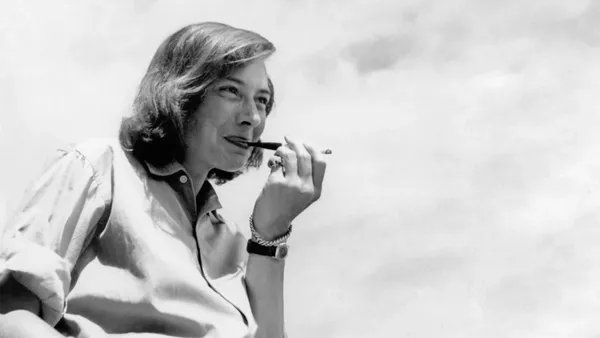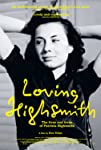Eye For Film >> Movies >> Loving Highsmith (2022) Film Review
Loving Highsmith
Reviewed by: Jennie Kermode

“I never wrote a mystery in my life. I just write a story.”
Patricia Highsmith, so she said, did not think of herself as an author especially concerned with murder. If fans of her work find this confusing, they might step back and consider that not all of her books feature murders, but they do universally concern themselves, in one way or another, with something every bit as troublesome: love.

Looking at Highsmith’s life through the lens of love is a daring thing for a documentary maker to do – it’s an approach not generally taken very seriously – but it hinges on the recognition that for LGBTQ+ people, love is inherently political. Not just sexual or romantic love, either. The film progresses in linear form, beginning in the author’s early childhood when she was taken away from a happy, carefree existence with her grandmother into the care of her mother, who wanted her to behave like a proper little girl and would, in due course, worry that she was ‘acting like a les.’ Director Eva Vitija posits that the course of the rest of her life would be heavily influenced by her efforts to win her mother’s love or live up to the standards her mother set for her.
That she made an effort to fit in is illustrated by her early efforts to find some kind of sexual or romantic connection with a man. There are no names here, and the matter is touched on only briefly; it is plain that it did not work. Her testimony comes through her prolific diary entries, read (in the English version of the film) by Gwendoline Christie. “Sexual intercourse to me is like steel wool in the face,” she says, not mincing words. Yet she never settled for long with any one woman, continually haunted by internalised homophobia, dealing with it through drink and other self-destructive behaviour.
Had social attitudes been different, he life might have been an easy one. She had a huge success early on in her writing career with Strangers On A Train, the Hitchcock adaptation making her name worldwide. The Price Of Salt (which Todd Haynes would later film as Carol), meanwhile, was an underground hit, published pseudonymously, only reclaimed at the very end of her life when, for the first time, she went back to making a serious attempt to write about women, in a work never to be finished. Vitija reveals that there was a real Carol, of a sort, a woman with whom Highsmith shared the moment of intense eye contact described in the book under similar circumstances, yet whom she never saw again. It reflects one of those moments have might-have-been, that awareness of the possibility of alternate lives, which all serious writers experience, making the book’s then revolutionary willingness to contemplate a happy ending all the more poignant.
Despite the evident loneliness in Highsmith’s life, it was far from dull or chaste. Her passion for travel comes across clearly in her diary entries and fragments of audio interview. The film is full of high quality photographs, a testament to the kind of people with whom she surrounded herself, and sometimes we see her posing in places where Tom Ripley and Chester MacFarland would go in her books. She seems to have had a girl in every port, and we meet some of them here, with fellow author Marijane Meaker speaking at length about their relationship, how easy Highsmith was to love and how impossible it became for the two of them to handle living together. We hear about the girlfriend who ran a flight school, meet the glamorous one in Berlin who played Ripley in a pirate film, hear whispers of the married one in Paris whose name cannot be uttered even now. Highsmith would cross oceans for love. That it never lasted for long does not suggest it wasn’t worth it.
Travel gave her much more besides. We hear about her nights in Berlin transvestite clubs where David Bowie would go, about the pleasure she found in going out one night as a glamorous woman and the next as a dashing young man. Her readers will find it easy to see how her fluid relationship with gender bled over into her novels. Able to afford only a limited amount of material from film adaptations of her work, Vitija incorporates the scene from The Talented Mr Ripley in which Matt Damon’s version of Ripley dances in front of a mirror in Dickie Greenleaf’s clothes. Ripley was her alter ego, it is argued – able to live life on his own terms with a lot less guilt and, eventually, with none at all.
Nobody – or at least no LGBTQ+ person – can read her work without being aware of the sexual tension which frequently exists between her male character pairings. There’s some reflection on that here, addressing its function as a means of challenging the straight world without putting her directly at risk, but also, perhaps more pertinently, its relationship to identity. She seems to have struggled a great deal to solidify a real sense of identity of her own. Whilst it’s distressing to note the racism and antisemitism in her later diary entries (but important that this be acknowledged in the film), one wonders how much it was a product of a deep-seated longing to fit in better with conventional white society. Aware that it’s ugly, she describes herself as poisoned by envy and resentment.
The film isn’t always successful. The use of rodeo footage as a metaphor, harking back to her Texan roots, is rather overdone and in places becomes distracting. Vitija rarely gets distracted from her approach, however, and this is a strength – not easy to achieve with so much material to pull together. Here and there, odd little details emerge. There’s a photograph of Highsmith’s mother in precisely one of the poses struck by Cate Blanchett in Carol, gazing out at the world across her furs. She would die 20 years before the film was made, from complications of leukaemia. With further adaptations of her work still being made (Adrian Lyne’s take on Deep Water was released in March 2022), her voice continues to be heard, and in this diligently crafted film, Vitija has given readers and viewers a chance to see her more directly. It's quite a story.
Reviewed on: 02 Sep 2022

















